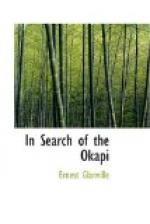“And the squeaking noise?”
“That is made by one branch rubbing against another. Wow! It is nothing. Hear them talk when a wind is blowing; then it is as if all the great ones were gathered together roaring to the four comers, with the voice of the storm booming from the skies, and the bellowing of a great herd of bulls, and in between the cries of women in fear and the screaming of tigers. Mawoh! It is then a man would hide in a hole. Now it is quiet; they but whisper among themselves half asleep, but in the morning they will stretch their limbs.”
“Of course,” said Compton, “and yawn!”
“How will a tree grow if it does not stretch? It bends this way and that, to loosen the bark, to make its body and its arms supple and tough, so that it can bend to the blast and yet spring back straight again. Tell me what would happen if the young tree were bark-bound. It would die—as these old ones die smothered by the creeping arms around them. Ow aye, they stretch in the morning and grow.”
So they talked in the night, and listened to the strange sounds that came mysteriously out of the brooding silence.
CHAPTER XIII
THE TREE-LION
The next day they came to the end of the trail that Muata had followed with the river-man; but the scent was still on the ground, and for a mile or so the jackal led the way, slinking along like a shadow with his nose down and his bushy tail drooping. Then he stopped, and, after a look up into the face of his master, stretched himself out, as much as to say his part was over.
“They have gained on us,” said Mr. Hume.
“They rose early and travelled fast,” said Muata. “The scent is cold, but there is the trail marked on the tree;” and he pointed to a slight cut in the bark, from which had oozed a thick juice, now caked hard.
“Some one pierced the bark.”
“It is the sign of the wise woman, and she made it, maybe, with a wire from her armlets.”
They went on more slowly, guided only by the faint cuts at intervals on tree-trunks, all of which “bled,” giving out a milky sap; and then again the sign failed. About them were the trees in endless columns, overhead was the roof of leaves, and on the ground was a tangle of undergrowth and decaying vegetation, that gave out a moist earthy smell, which set the lungs labouring for oxygen. The boys were uncomfortable. Their skins were clammy, their eyes were heavy, and their limbs languid. Mr. Hume was glad to sit down, and even Muata showed the effect of the muggy atmosphere in a dulling of his skin. The river-man, sullen and silent, was alone apparently unaffected; but they did not reckon him one of the party, for no one of them had broken through his apathy.
Muata began patiently to make casts in that labyrinth that seemed to hold no living thing but themselves, and as he went slowly through the undergrowth, the boys went off to sleep, from which they awoke, heavy and unrefreshed, at the cry to “fall in.”




